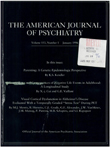Low level of response to alcohol as a predictor of future alcoholism
Abstract
OBJECTIVE: As part of a search for measurable attributes of an individual that might be related to the risk of alcoholism, the author's group previously compared 227 sons of alcoholics and 227 matched comparison subjects at the age of about 20 years. Forty percent of the men at high risk for alcoholism and less than 10% of the comparison subjects demonstrated a low intensity of response to alcohol challenge. This article reports the results of the follow-up of the first half of this study group almost a decade later. METHOD: Of the men who had been tested at about age 20, 223 were about age 30 at this evaluation, which included personal and resource-person interviews, record searches, urine toxicology screens, and blood level markers of drinking. RESULTS: A low level of response to alcohol at age 20 was associated with a fourfold greater likelihood of future alcoholism in both the sons of alcoholics and the comparison subjects. Fifty-six percent of the sons of alcoholics with the lesser alcohol response developed alcoholism during the subsequent decade, compared to 14% of the men in this group who had highly sensitive alcohol responses. Neither family history of alcoholism nor response to alcohol predicted any other psychiatric diagnoses over the subsequent decade, and neither was a significant predictor of any other substance use disorder. CONCLUSIONS: In a heavy-drinking society, a lower sensitivity to modest doses of alcohol is associated with a significant increase in the risk of future alcoholism, perhaps through increasing the chances that a person will drink more heavily and more often.
Access content
To read the fulltext, please use one of the options below to sign in or purchase access.- Personal login
- Institutional Login
- Sign in via OpenAthens
- Register for access
-
Please login/register if you wish to pair your device and check access availability.
Not a subscriber?
PsychiatryOnline subscription options offer access to the DSM-5 library, books, journals, CME, and patient resources. This all-in-one virtual library provides psychiatrists and mental health professionals with key resources for diagnosis, treatment, research, and professional development.
Need more help? PsychiatryOnline Customer Service may be reached by emailing [email protected] or by calling 800-368-5777 (in the U.S.) or 703-907-7322 (outside the U.S.).



